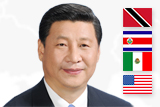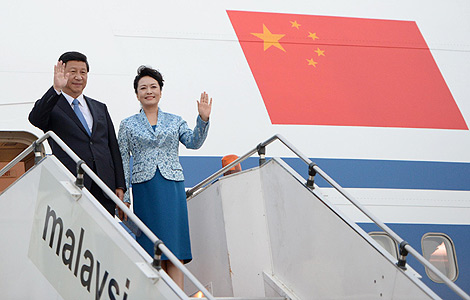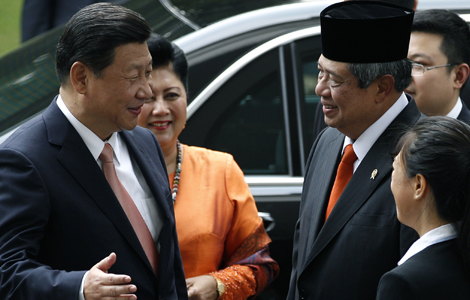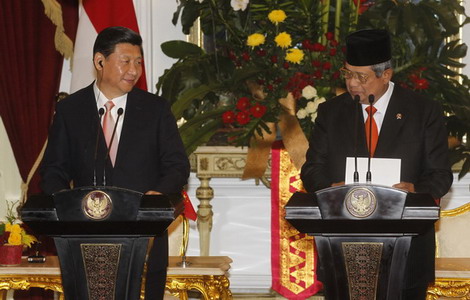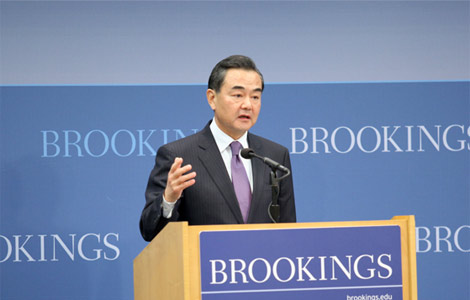Xi in call for building of new 'maritime silk road'
By WU JIAO in Jakarta and ZHANG YUNBI in Beijing ( China Daily )
Updated: 2013-10-04
President Xi Jinping proposed on his maiden Southeast Asian trip on Thursday to join efforts with countries in the region to build a new "maritime silk road".
Observers said the proposal, made by Xi during a speech to the Indonesian parliament, aimed at enhancing maritime partnership against the backdrop that China's geopolitical ties with its Southeast Asian neighbors brings both opportunities for cooperation and challenges from territorial disputes.
 |
|
President Xi Jinping and his wife, Peng Liyuan, attend a photography exhibition focused on Sino-Indonesian friendship, on Thursday in Jakarta. Below: Xi addresses the Indonesian parliament, the first foreign leader ever to do so. [Lan hongguang / XINHUA] |
Xi left for Kuala Lumpur on Thursday evening for a state visit to Malaysia,where he is scheduled to meet Supreme Head of State Abdul Halim Mu'adzam Shah, and will also hold talks with Malaysian Prime Minister Najib Razak.
The new maritime silk road has a win-win strategic significance for both China and the 10 members of the Association of Southeast Asian Nations, said experts.
Since ancient times, Southeast Asia has been an important hub along the historical "maritime silk road", a commercial route on which China sold its silk and other commodities to other countries.
According to Xi, to build the new "maritime silk road", China will strengthen maritime cooperation with ASEAN countries "to make good use of the China-ASEAN Maritime Cooperation Fund set up by the Chinese government".
This is Xi's first visit to an ASEAN member country since taking office in March, and the policy speech, elaborating on China's overall policy toward ASEAN, is the first made by a foreign leader to the Indonesian parliament.
Yang Baoyun, a professor of Southeast Asian studies at Peking University, said the new route will directly facilitate China's economic development and neighborly diplomacy with Southeast Asian nations.
"Like the historical route centuries ago, the new maritime silk road will bring tangible benefits to neighbors along the route, and will be a new driving force for the prosperity of the entire East Asian region," said Yang.
Xi's speech on Thursday has been widely interpreted as signaling China's ASEAN policy under the new leadership.
During the speech, Xi underscored the "shared destiny" of China and ASEAN members, saying that China is ready to open itself wider to ASEAN countries and to enable ASEAN countries to benefit more from China's development.
Xi said China is ready to discuss with ASEAN countries the prospect of concluding a treaty of good-neighborliness, friendship and cooperation in a joint effort to build good-neighborly relations.
Ruan Zongze, vice-president of the China Institute of International Studies, said a unified voice is expected from Southeast Asian nations to resonate with China's diplomatic effort to further stabilize the regional situation.
Xi said Beijing welcomed a constructive role by countries from outside the region in the development and stability of Southeast Asia, but these countries should respect the diversity of the region and do more to facilitate regional development and stability.
Bambang Suryono, leader writer of the Indonesian newspaper Sinchew Daily, who listened to Xi's speech, said President Xi's proposals made during his trip to Indonesia have brought enormous opportunities for regional development.
Xi proposed both on Wednesday and Thursday to set up an Asian investment bank to support regional connectivity construction.
Suryono said the proposal is very important for Indonesia, as the country has drawn up a $400 billion plan for its domestic infrastructure construction and requires investment.
China is expected to take a more proactive role in promoting connectivity construction in the region, and "obstacles in financing, legislation and standards" should be addressed with joint efforts as soon as possible, said Zhang Yunling, a senior research fellow on Asia-Pacific studies at the Chinese Academy of Social Sciences.
"If the connectivity projects with the region finally achieve smooth interconnection with each other, the China-ASEAN free trade zone will see a much greater potential to be tapped into," Zhang said.
A modernized rail network that connects ASEAN members remains to be established, and imbalanced infrastructure construction within the nations has become a bottleneck for further upgrading China's trade links with them, Zhang said.
With regard to differences and disputes between China and some Southeast Asian nations on territorial sovereignty and maritime rights and interests, Xi said: "Peaceful solutions should be sought, and differences and disputes should be properly handled through dialogue on an equal footing and friendly consultation in the overall interests of bilateral ties and regional stability."
Recent years have seen the Philippines stirring up the South China Sea situation with its attempt to internationalize claims on some of the islands.
"But it has been proved that the tangible benefits of cooperation far outweigh individual territorial problems," Yang Baoyun said.
Eddy Sadeli, a member of Indonesian parliament, said he was impressed by Xi's speech as "Xi really knows well the history of the relationship between Indonesia and China".
He said that as an important member of ASEAN, Indonesia will play a role in overall ties between China and ASEAN.
Contracts signed
Xi and his Indonesian counterpart Susilo Bambang Yudhoyono on Thursday also witnessed the signing of cooperation agreements worth $23.6 billion by business leaders from the two countries.
"These agreements fully prove that China and Indonesia greatly complement each other in the economic field and have broad prospects for development," Xi told a luncheon attended by business leaders from the two countries.
The contracts signed covered a wide range of sectors, including minerals, refining, infrastructure, telecommunications and power grids.
Xi said the two nations are both undertaking the mission of domestic economic development and improving their people's livelihoods. The two sides should work together and tap into the great potential for bilateral trade to lift this figure to $80 billion at an early date.
Schedule
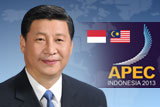
President Xi visits Indonesia, Malaysia, attend APEC summit
Oct 2 to 3: Pay State Visit to Indonesia
Oct 4 to 5: Pay State Visit to Malaysia
Oct 6 to 8: Attend the 21st economic leaders' meeting of APEC forum and meet with global leaders in Bali, Indonesia
Forum
China and ASEAN to handle territorial issues like friends
China and its neighbours should handle the issue of territorial claims as a problem between friends rather than a conflict with one another.
China should increase investment in ASEAN
China should ratchet up cooperation with Association of Southeast Asian Nations countries to expand Beijing's regional influence while countering Washington's Asia-Pacific pivot strategy.


